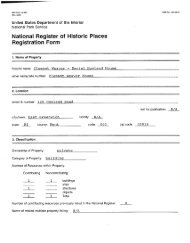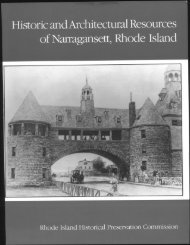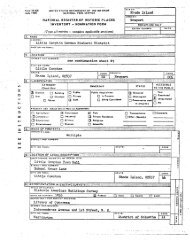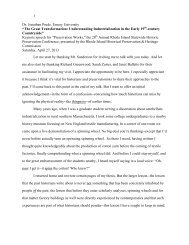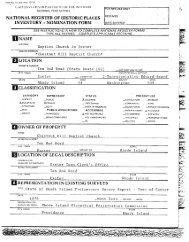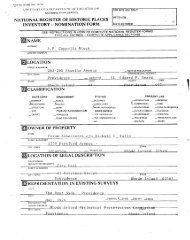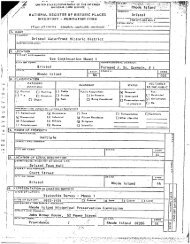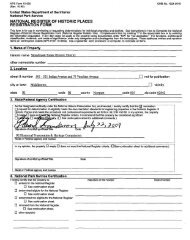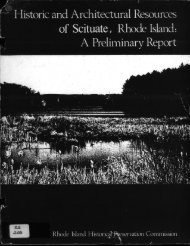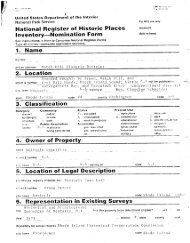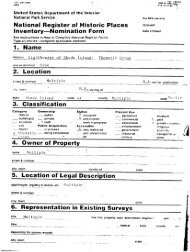National Park Service - Rhode Island Historical Preservation ...
National Park Service - Rhode Island Historical Preservation ...
National Park Service - Rhode Island Historical Preservation ...
Create successful ePaper yourself
Turn your PDF publications into a flip-book with our unique Google optimized e-Paper software.
0MB Nt 1024-0018<br />
NPS Form 10-900-i - - En,- 10-31-U<br />
3-82<br />
United States Department of the Interior<br />
<strong>National</strong> <strong>Park</strong> <strong>Service</strong> - - -<br />
<strong>National</strong> Register of Historic Places<br />
Inventory-Nomination Form -<br />
Continuation sheet 46 -<br />
- Item number 8<br />
Page 2<br />
The village was the creation of the Hazard family over four<br />
generations. Their accomplishments as industrialists, both in<br />
terms of innovation and success, were matched by dedication to an<br />
improved social order, and the munificence of their philanthropy.<br />
The Hazards were Friends into the -mid-nineteenth century. There<br />
is- about their seriousness, ambition, and commitment -- and in<br />
the sobriety, unity and air of elevated amenity encountered in<br />
their village--much which reflects Quakerly attitudes. Named by<br />
- the founder of the family woolens business, Rowland Hazard I, for<br />
his wife, Mary Peace, "Peace Dale" bespeaks what was sought--a<br />
community living in sweet harmony with itself.<br />
Peace Dale merits consideration in at least seven of the<br />
established <strong>National</strong> Register "areas of significance" -architecture,<br />
art, community planning, engineering, industry,<br />
landscape architecture and the catchall "social/humanitarian"<br />
category. Of these, the most important areas are the last, and<br />
industry. Before substantiating these seven areas of<br />
significance, however, it will be useful first to review the<br />
history of the Peace Dale Manufacturing Company, the Hazard<br />
family, and the village.<br />
During the late seventeenth and early eighteenth centuries,<br />
South Kingstown and much of Washington County were dominated by a<br />
small group of families owning large plantations devoted to<br />
commercial agriculture directed to export through nearby Newport.<br />
Among these "Narragansett Planters" the Quaker Hazards were the<br />
largest and most powerful clan. In the late eighteenth century<br />
Rowland Hazard I left <strong>Rhode</strong> <strong>Island</strong> to establish itself in the<br />
shipping business in Charleston, South Carolina. There he<br />
married Mary Peace. In the 1790s, war in Europe played havoc<br />
with American maritime commerce, and in 1799 Rowland Hazard<br />
returned to South Kingstown with his w-ife. In 1804 he purchased<br />
a 1/3 interest in a small wool-carding mill at a water power<br />
privilege on the Saugatucket River. During the next few years<br />
his involvement in the business grew. He began putting out his<br />
carded wool to be spun in area homes, then taking the yarn<br />
produced and putting it out to be hand-woven into cloth by local<br />
- weavers. Hazard purchased the mill privilege outright in 1812<br />
and invested in experimental machinery including primitive power<br />
looms. -By 1815, Rowland Hazard I ran a small, fully integrated<br />
manufacturing operation, going from raw material to finished<br />
goods; it is said to have been one of the first such textile<br />
plants in America. -



